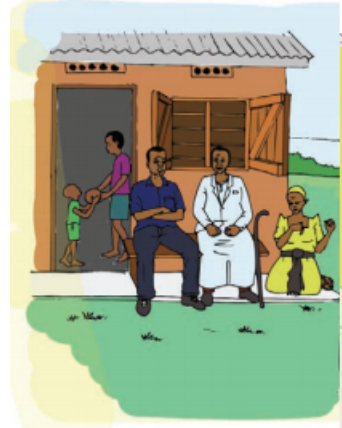Upbringing and education arrangements

Parents should make agreements on child support and, for the best interest of the child, support the other parent where needed
Both parents are responsible for costs of upbringing the child such as school fees, food, clothing and other expenses. It is important for parents to agree on child support. Parents should also be willing to support their children outside these agreements. Occasionally, children might need more food, clothing or other items than expected. Research shows that providing formal and informal child support benefits the wellbeing of children. Formal child support includes mutually agreed arrangements on financial contributions towards the costs of children. Informal child support may include other things from providing food, shelter, clothing, emotional support etc.
Legal base
Uganda Constitution, Article 32 Clause 4 Both parents are responsible for the upbringing of children and the costs related to this.
bwebumu balina okubeera mu mitambo gy’ebintu.
Abazadde balina okusuubira enneyisa ey’ekikulu mu baana babwe, nga kw’otadde n’omukwano omusuffu. Kino kitegeeza nti babalaga okwagala, obuwagizi, okubalondoola, okwasiza empisa, okuteeseganya n’okuwuliriza ebyetaago by’abaana babwe. Abazadde balina okusinzira ku kubonereza abaana okuzimba balyoke babawulirizeemu era balina okukubiriza abaana okwogera singa babeera ssi bamattivu. Kino kyebayita obuzadde bw’obugunjuzi. Okusinziira ku kunomyereza kw’ebunayira, omuzadde omugunjuzi akola kinene mu ngeri omwana gy’akola mu ku ssomero.
Waliwo engeri z’obuzadde za mirundi essatu (3) nga bulii emu erina engeri gy’ekuzzamu omwana:
Obuzadde obw’obugunjuzi. – Wano abazadde balina bingi byebasuubira mu baana babwe, naye era babalaga omukwano n’okufaayo ku byetaago byabwe. Buno bwe buzadde obusinga okukuza abaana obulungi.
Obuzadde obugyinya abaana. – Wano abazadde balaga omukwan mungi n’okufaayo eri abaana, naye ate tebabawabula wadde okubalaga eky’okukola.
Obuzadde obw’obukambwe – Abazadde bakambwe, basuubira bingi mu baana babwe naye ate tebadaayo ku byetaago byabwe.
What practitioners say
Consistent with literature research:
Consider all options. Non-monetary contributions should be considered, not just financial agreements. These may include spending time with house chores, support with homework, moral upbringing or other forms of support for children.
Both parents should be involved in the moral education of children. Both parents each play an important role in children’s development, even after separation or re-marriage.
Parents should together decide and agree on the school for the child. Parents should take the best interests of the child into account together and make a joint decision on the best schooling arrangement.
Both parents should contribute to upbringing of children. Besides contributing to educational and other financial costs, the moral support and education of children should continue from both parents.
Other suggested practices:
Children might need a guardian. There may be cases where a parent is not in the picture. A guardian could be responsible for the upbringing arrangements for children.
Ziri ku mulamwa n’okunonyereza okuli mu biwandiiko:
Abaana bagunjule n’omukwano. Omwana mugunjule mu ngeri essaana. Wewale okubatulugunya okuyinza okubaleetera obulabe.
Abazadde bombi balina okwenyigira mu kusoma kw’abaana. Abazadde bombi balina okwenyigira mu kusoma kw’omwana. Bombi balina okubeera nga bamanyi embeera y’okusomero era nga bakwatagana n’abasomesa, nga babayambako ku waaka w’awaka.
Abazadde tebalina kusosola mu baana. Bonna abawala n’abalenzi balina okwagalibwa eky’enkanyi abazadde bombi.
Kkakasa nti abawala n’abalenzi bayisibwa kyenkanyi. Tewalina kubeerawo kusosola mu kubagabira ebintu n’emiru, ne mu ku babonereza.
Twala akabanga okuteegera ebyetaago by’abaana. Abazadde balina okukkakkasa nti bategeera ebyetaago by’abaana ate nga babibatuusaako.
Ebirala ebiyinza okukolebwa:
Kkakasa ng’abaana b’ebuuzibwako ku kusoma kwabwe. Kkakasa nti batebenkevu era basanyufu eyo gyebasomera.
Gezaako okweyongera okuyiga ku ngeri z’okukuza mu abaana. Buuza ku balala oba waliyo w’oyinza okugya ebiyinza okukuyambako okuyiga kungeri z’okukuza abaana obulungi. Muno mulimu pulogulamu ku leediyo, ebitabo oba enkungaana.
Resources and Methodology
During the orientation process of the available literature, we were able to identify three interventions, these being:
- Formal and informal child support provided by non-residential parent
- Only formal child support provided by non-residential parent.
- No child support Formal child support payments are received through a welfare office (Greene and Moore, p. 159).
These are payments agreed upon beforehand. Informal child support includes money given directly to the residential parent, groceries, clothes or other items (Greene and Moore, p. 159). These payments are not agreed upon beforehand.
For the purpose of this PICO question we compare providing formal and informal support with only providing formal child support by the non-residential parent. Research shows that nonresident fathers provide a considerable amount of in-kind support instead of cash support (Greene & Moore, p. 174).
With regards to the third intervention (i.e. not paying child support), research shows that nonresidential fathers’ support not only increase children’s standard of living, but also improve children’s health, educational attainment and general well-being (Amato & Gilbert, p. 557-558; Garasky et al, p. 365). Providing child support would therefore be clearly desirable over not providing for child support. For this reason we do not test this intervention.
For parents deciding on the costs for their children’s upbringing, is formal and informal child support provided by the non-resident parent more effective than the non-resident parent providing only formal support for their children’s well-being?
The databases used are: HeinOnline, Westlaw, Wiley Online Library, JSTOR and Taylor & Francis, Peace Palace Library.
For this PICO question, keywords used in the search strategy are: child, maintenance, support, child-care, formula, support, child support, child maintenance, in-kind payments.
The main sources used for this particular subject are:
- Maureen R. Waller & Robert Plotnick, Effective Child Support Policy for Low-Income Families: Evidence from Street Level Research (2001)
- Paul R. Amato & Joan G. Gilbert, Nonresident Fathers and Children’s Well-being: A Meta-Analysis (1999)
- Lenna Nepomnyaschy, Child Support and Father-Child Contact: Testing Reciprocal Pathways (2007)
- Angela Greene & Kristin Moore, Nonresident Father Involvement and Child Well-Being Among Young Children in Families on Welfare (2000)
- Steven Garasky et al, Toward a Fuller Understanding of Nonresident Father Involvement: An Examination of Child Support, In-Kind Support, and Visitation (2009)
Waller and Plotnick analyse findings from qualitative studies to understand why the child support system is ineffective for many low-income families. Amato and Gilbert use meta-analytical methods to explain how dimensions of the non-resident father-child relationship are linked with children’s well-being. Nepomnyaschy’s study examines the relationship between child support payments and fathers’ contact with their nonmarital children. Greene and Moore use descriptive data to research factors that predict father involvement among non-resident fathers of young children who receive welfare and whether nonresident father involvement is associated with better outcomes for these children. Garasky et al investigate the relationships among three aspects of father involvement namely, child support, in-kind support and visitation. According to the HiiL Methodology: Assessment of Evidence and Recommendations, the strength of this evidence is classified as ‘moderate’.
Desirable outcomes
Mothers who receive formal and informal support from fathers report fewer behavioral problems and higher levels of social and emotional adjustment for their children (Greene and Moore, p. 175).
Regarding the well-being of children, both formal and informal child support are positively associated with better ratings on the Personal Maturity Scale (an outcome variable used in this research, which focuses on the child’s emotional and behavioral development) (Greene and Moore, p. 175). Informal child support is associated with improvements in the child’s home environment (Greene and Moore, p. 176). Over time, informal support from the father may be associated with improvements in cognitive assessment scores and academic achievements for children.
Fathers who pay child support may want to see their children more, in order to oversee the allocation of their contributions (Nepomnyaschy p. 94). A stronger positive relationship exists between visitation and support provided by a nonresident father when that support is made informally to the child’s mother (Nepomnyaschy, p. 94).
Child support seeks to ensure that parents who live apart from their children contribute to their financial support in order to achieve specific goals such as poverty and financial insecurity reduction among children and their custodial parents. Child support also seeks to affirm the widely held belief that parents are morally and socially obligated to support their children (Waller & Plotnick, p. 89).
Child support is thought to have symbolic meaning, representing the non-resident parent’s care and concern to the child; and this may improve the child(ren)’s well-being beyond the effects of raising the child’s standard of living, to a psychological contribution (Garasky et al, p. 365).
Undesirable outcomes
Mothers mention that conflict may arise when the father begins to pay child support and stop supporting them informally or doing the “extras” for their children (Waller & Plotnick, p. 101). Moreover, these conflicts can make already difficult parenting arrangements more hostile and may lead to their dissolution (Waller & Plotnick, p. 99).
After low-income parents become involved with the formal system and a support order is established, concerns about how the system enforces support orders arise. Mothers often perceive it as ineffective in enforcing their rights to support. Fathers become frustrated with the system’s insensitivity to their changeable economic circumstances and its use of criminal sanctions to enforce compliance. These perceived problems with the enforcement process are likely to contribute to poor parents’ reluctance to participate in the formal system in the first place (Waller & Plotnick, p. 101).
Punitive child support enforcement policies may drive fathers who are incapable of providing support to abandon their families altogether (Nepomnyaschy, p. 109).
To some fathers, formal child support represents a forced payment rather than an authentic expression of paternal love (Waller & Plotnick, p. 100). Some women agree with this assessment of child support, as both tainted and unreliable because it does not derive from an emotional bond (Waller & Plotnick, p. 100-101).
Balance of outcomes
In determining whether providing formal and informal support by the non-residential parent is more effective than providing only formal child support by the non-residential parent, for the financial well-being of persons the desirable and undesirable outcomes of both interventions must be considered.
Although some parents sometimes did not comply with child support regulations, these studies suggest that they strongly endorse the belief that fathers have an obligation to support their biological children and be involved in their lives. All studies indicate that communities recognise in-kind contributions such as diapers, toys, clothing and shoes as valid expressions of this paternal obligation (Waller & Plotnick, p. 100).
In sum, the effect on well-being of the desirable outcomes are more far-reaching than the effects on wellbeing of undesirable outcomes.
Recommendation
Taking into account the clear balance towards the desired outcomes, and the strength of the evidence, we make the following recommendation: Receiving both formal and informal child support is more effective than receiving only formal child support.


